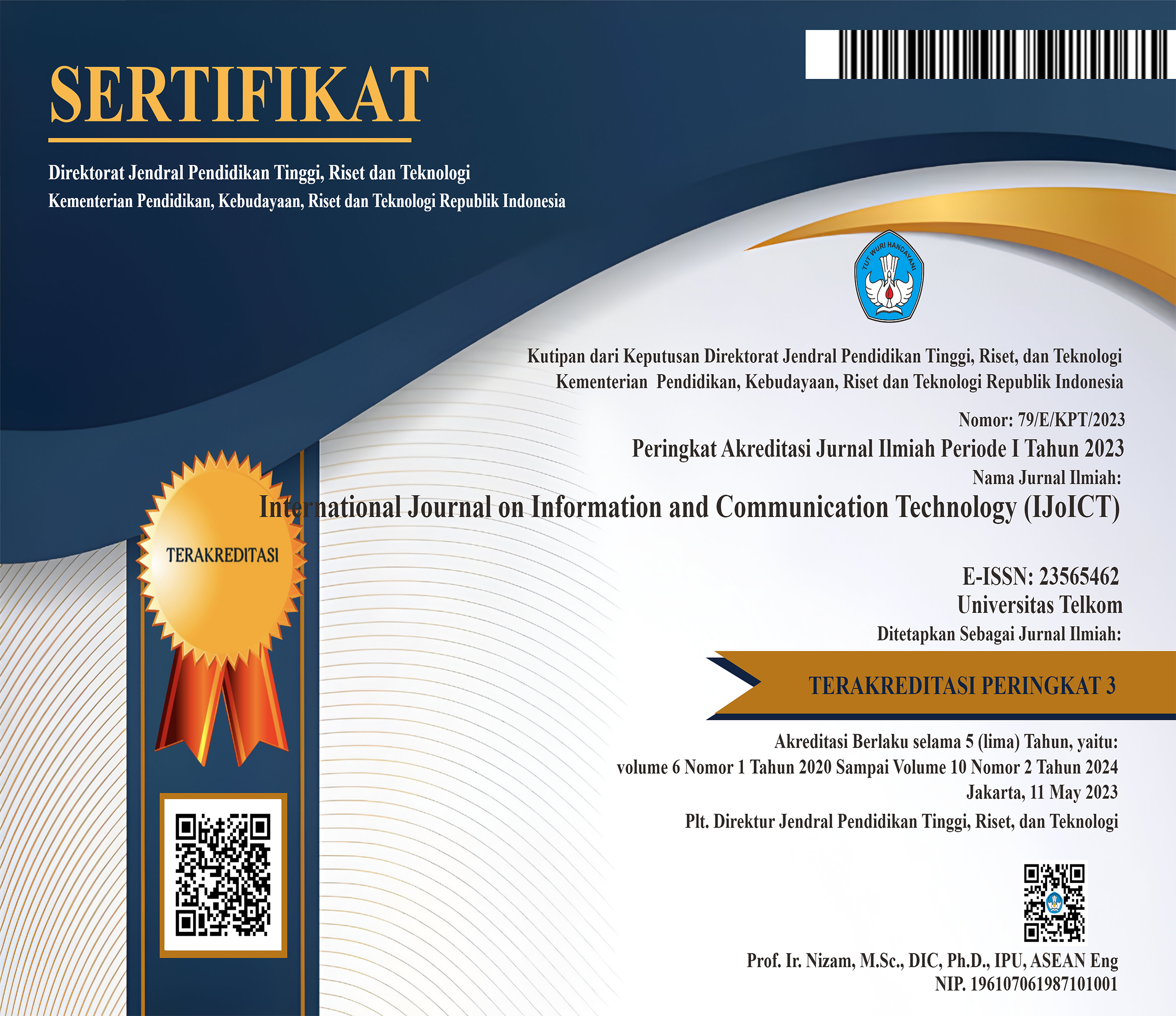Recommender System Based on Matrix Factorization on Twitter Using Random Forest (Case Study: Movies on Netflix)
DOI:
https://doi.org/10.21108/ijoict.v8i2.655Keywords:
Matrix Factorization, Random Forest, Recommender System, TwitterAbstract
In this day and age, there is a lot of entertainment that can be done, one of which is watching movies using the Netflix platform. When you want to watch, sometimes users can be confused about which movies to watch according to their tastes and interests, which requires a solution, namely by using a recommendation system. The recommendation system is a system that emerged as a solution to provide information by learning data from users with previously stored data items. One of the recommendation system techniques is Collaborative Filtering. By using Collaborative Filtering, this study will focus on using Matrix Factorization-based because it is considered more efficient and allows the incorporation of additional information in the data. This study will use the Random Forest algorithm to improve the results of good predictions. In this study, a recommendation system based on Matrix Factorization on Twitter will be made using Random Forest in a case study of films on Netflix. The experimental results have shown that the use of the system gets a Mean Absolute Error (MAE) value of 0.7641 to 0.8496 and a Root mean squared error (RMSE) of 1.0359 to 1.1935.
Downloads
References
[2]AlSomaikhi, Noura & Alzamil, Zakarya. (2020). Twitter Users' Classification Based on Interest: Case Study on Arabic Tweets. International Journal of Information Retrieval Research. 10. 1-12. 10.4018/IJIRR.2020010101.
[3]Ortega, Fernando & Hernando, Antonio & Bobadilla, Jesus & Kang, Jeon-Hyung. (2016). Recommending Items to Group of Users using Matrix Factorization based Collaborative Filtering. Information Sciences. 345. 10.1016/j.ins.2016.01.083.
[4]H. Tan, J. Guo and Y. Li, "E-learning Recommendation System," 2008 International Conference on Computer Science and Software Engineering, 2008, pp. 430-433, DOI: 10.1109/CSSE.2008.305.
[5]Y. Koren, R. Bell and C. Volinsky, "Matrix Factorization Techniques for Recommender Systems," in Computer, vol. 42, no. 8, pp. 30-37, Aug. 2009, DOI: 10.1109/MC.2009.263.
[6]P. Nagarnaik and A. Thomas, "Survey on recommendation system methods,"Â 2015 2nd International Conference on Electronics and Communication Systems (ICECS), 2015, pp. 1603-1608, DOI: 10.1109/ECS.2015.7124857.
[7]X. Li, Z. Wang, L. Wang, R. Hu and Q. Zhu, "A Multi-Dimensional Context-Aware Recommendation Approach Based on Improved Random Forest Algorithm," in IEEE Access, vol. 6, pp. 45071-45085, 2018, DOI: 10.1109/ACCESS.2018.2865436..
[8]M. Ilhami and Suharjito, "Film recommendation systems using matrix factorization and collaborative filtering,"Â 2014 International Conference on Information Technology Systems and Innovation (ICITSI), 2014, pp. 1-6, DOI: 10.1109/ICITSI.2014.7048228.
[9]Gopi, A.P., Jyothi, R.N.S., Narayana, V.L. et al. Classification of tweets data based on polarity using improved RBF kernel of SVM. Int. j. inf. tecnol. (2020). https://doi.org/10.1007/s41870-019-00409-4.
[10]Hammou, Badr & Ait Lahcen, Ayoub & Mouline, Salma. (2019). “An Effective Distributed Predictive Model with Matrix Factorization and Random Forest for Big Data Recommendation systemsâ€. Expert Systems with Applications. 137. 10.1016/j.eswa.2019.06.046.
[11]Nedjati-Gilani, Gemma & Schneider, Torben & Hall, Matt & Cawley, Niamh & Hill, Ioana & Ciccarelli, Olga & Drobnjak, Ivana & Gandini Wheeler-Kingshott, Claudia & Alexander, Daniel. (2017). Machine learning based compartment models with permeability for white matter microstructure imaging. NeuroImage. 150. 10.1016/j.neuroimage.2017.02.013.
[12]Kywe S.M., Lim EP., Zhu F. (2012) A Survey of Recommender Systems in Twitter. In: Aberer K., Flache A., Jager W., Liu L., Tang J., Guéret C. (eds) Social Informatics. SocInfo 2012. Lecture Notes in Computer Science, vol 7710. Springer, Berlin, Heidelberg. https://doi.org/10.1007/978-3-642-35386-4_31.
[13]Fakhri, Alif & Baizal, Abdurahman & Setiawan, Erwin. (2019). Restaurant Recommender System Using User-Based Collaborative Filtering Approach: A Case Study at Bandung Raya Region. Journal of Physics: Conference Series. 1192. 012023. 10.1088/1742-6596/1192/1/012023.
[14]Yueming Sun and Yi Zhang. 2018. Conversational Recommender System. In The 41st International ACM SIGIR Conference on Research & Development in Information Retrieval (SIGIR '18). Association for Computing Machinery, New York, NY, USA, 235–244. DOI: https://doi.org/10.1145/3209978.3210002.
[15]Y. Shiraishi and Y. Takama, "Proposal on matrix-based collaborative filtering using personal values,"Â 2017 IEEE 10th International Workshop on Computational Intelligence and Applications (IWCIA), 2017, pp. 55-60, DOI: 10.1109/IWCIA.2017.8203561.
[16]A. Ajesh, J. Nair and P. S. Jijin, "A random forest approach for rating-based recommender system," 2016 International Conference on Advances in Computing, Communications and Informatics (ICACCI), 2016, pp. 1293-1297, DOI: 10.1109/ICACCI.2016.7732225.
[17]Shani G., Gunawardana A. (2011) Evaluating Recommendation Systems. In: Ricci F., Rokach L., Shapira B., Kantor P. (eds) Recommender Systems Handbook. Springer, Boston, MA. https://doi.org/10.1007/978-0-387-85820-3_8.
[18]Chai, T., & Draxler, R. R. (2014). Root mean square error (RMSE) or mean absolute error (MAE)? -Arguments against avoiding RMSE in the literature. Geoscientific Model Development, 7(3), 1247–1250. https://doi.org/10.5194/gmd-7-1247-2014.
[19]Yoshua, I., & Bunyamin, H. (2021). Pengimplementasian Sistem Rekomendasi Musik Dengan Metode Collaborative Filtering. Jurnal STRATEGI-Jurnal Maranatha, 3(1), 1-16.
Downloads
Published
How to Cite
Issue
Section
License
Manuscript submitted to IJoICT has to be an original work of the author(s), contains no element of plagiarism, and has never been published or is not being considered for publication in other journals. Author(s) shall agree to assign all copyright of published article to IJoICT. Requests related to future re-use and re-publication of major or substantial parts of the article must be consulted with the editors of IJoICT.








.png)

.jpg)




